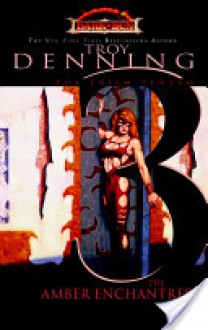
Well, this is the first of the Dark Sun novels (there are five in this series) and I am not really sure whether I have read them all. There was a time when I read a lot of the novels released around D&D worlds, but that was usually because a friend handed them to me and said, 'read this, it's good'. Well I did, and I did sort of enjoy it, but looking back on it from this point in my life I do actually wonder whether these books are really all that fulfilling, or simply publicity stunts.
What I remember about this book is that it is about a slave who escapes slavery, hides in the mountains, befriends some ravenous halflings, and then returns to the city of Tyr with a rag-tag army and defeats the sorcerer king. It does sound somewhat like a quest, however while it is a quest, I am not convinced that many, if any, of the Dungeons and Dragons related books can really be described as quest books in the truest sense of the word. This concept, that I have outlined, is that a young boy is thrust into a quest, and through the quest becomes an adult. While it is not necessarily something we all face, the quest narrative can be allegorical for not only our rise to adulthood, but also a journey to come to understand ourselves.
Darksun is the first of the D&D worlds to actually use slavery. It is not that slavery is endorsed (it never is) and while a number of other worlds do have slavery (such as the drow and the mind flayers, though the mind flayers tend to use their slaves more as cattle than as a work force) generally it was something that sat in the background that nobody really thought about, unless the adventure involved busting open the ring (as with one series of adventures). In a way I always found it quite disturbing (at least after I completed university) that slavery was never really explored in the D&D world. Obviously we do not wish to condone it, since we like to think that we have moved on from that rather distasteful period of our history.
However, slavery, I might argue, is still alive and well. There is obviously actual slavery, which tends to involve kidnapping people (usually from developing countries) and selling them to the highest bidder. There is also a form of slavery where people are promised a new life in a developed country, but upon arriving there, they discover that the smugglers have yoked them with a huge debt and force them to work in substandard conditions for little pay. One could also argue that unless we are working for ourselves, we are slaves to our employer, but I will argue otherwise.
The difference between an employment contract and being a slave is ownership. A contract is a mutual agreement of obligations. We agree to perform duties for our employer, and our employer agrees to pay us. Our employer does not own us (slavery involves property) but has an agreement with us, and both of us are expected to hold to our end of the bargain (the law of contract makes sure of that). This does not mean that bargaining power is always equitable, that is not always the case, but it is not ownership. A slave cannot simply hand in a letter of resignation and walk away. However, there is also the concept of debt. We may not be indebted to our employer, but we may be indebted to others, such as the bank. While the bank does not own us, we are in a contract with the bank, and are expected to uphold our end of the bargain (such as paying back the loan), and refusal to do so can result in civil penalties. Fortunately though, debtor's prisons have long since been abolished.

 Log in with Facebook
Log in with Facebook 






